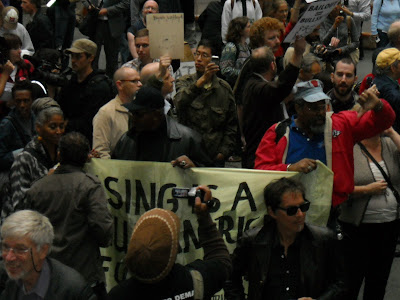NEW YORK — An angry US public and Congress are pushing to snip the rip cord on golden parachutes used by fat cat CEOs to escape Wall Street's mayhem.
Democrats in Congress -- set to resume emergency talks Friday with their Republican counterparts on a 700-billion-dollar (478-billion-euro) bailout for the financial industry -- insisted that any agreed package include restrictions on executive pay.

They caught the mood of a nation sickened at watching the titans of finance walk away from Wall Street disasters not only unscathed, but enriched. "The wealthiest people, those... in the best position to pay, are being asked for no sacrifice at all," read a petition to Treasury Secretary Henry Paulson, which by Thursday, after three days, had 32,600 signatures.
The petition, organized by independent Senator Bernie Sanders from Vermont, attacked what it described as the Treasury's attempt to let bungling executives "continue to make exorbitant salaries and bonuses."


Those gigantic pay checks, bonuses, and Midas-like farewells encapsulate what the public sees as Wall Street's greed-is-good philosophy.


For example, the CEO of bankrupt Lehman Brothers, Richard Fuld, received total compensation of 71.9 million dollars in 2007, including stock, bonuses and other pay, according to a survey published by Forbes magazine.
Martin Sullivan, the chief executive of AIG, who left the insurance giant before it was rescued this month by the federal government, received 14 million dollars, a survey in USA Today said. He also quit with a severance package worth 47 million dollars.
Even punishment for those at the center of the chaos comes with a gold lining.

When the government took over collapsed mortgage giants Fannie Mae and Freddie Mac, ousted bosses Daniel Mudd and Richard Syron were not allowed 12.59 million dollars worth in severance payments.
Yet they still got out the door with 9.43 million dollars in retirement benefits.


Public anger at such figures underlies skepticism about the entire government rescue.
"We'll never see that money again," said Mathew May, a 24-year-old economics student attending a small demonstration near the New York Stock Exchange. "They deregulated the markets and ran wild. Now we're bailing them out."Arun Gupta, an editor of alternative New York newspaper The Indypendent, said there was "socialism for the rich and dog-eat-dog capitalism for the rest of us."


"Think about it," Gupta wrote in an email that quickly circulated to thousands of activists and inspired the New York street protest. "They said providing healthcare for nine million children, perhaps costing six billion dollars a year, was too expensive, but there's evidently no sum of money large enough that will sate the Wall Street pigs."


And left-wingers are not the only ones speaking out.


Newt Gingrich, the fiercely conservative former speaker in the House of Representatives, wrote in the National Review that the bailouts, likely to top a trillion dollars, smack of "crony capitalism."


"Doesn't that mean that we're using the taxpayers' money to hire people to save their friends with even more taxpayer money?" he asked.


Forbes, the magazine for and about the rich, also said enough was enough.


"The compensation schemes for Wall Street CEOs should be capped to a small fixed amount," wrote national editor Robert Lenzner.


"The rest should be dependent on performance in a way that does not reward taking greater risk than is prudent. If CEOs don't perform, they should get nothing."


One worker in the New York finance sector, who asked not to be named, said his colleagues were as angry as the general public.
"A lot of people are very upset that managers in their own companies and captains of industry in other areas made some really, really bad decisions," he said.


"The most insulting thing is the golden parachutes where these jackals from Fannie and Freddie, having destroyed the company, walked away with millions.... It all comes down to greed."









































